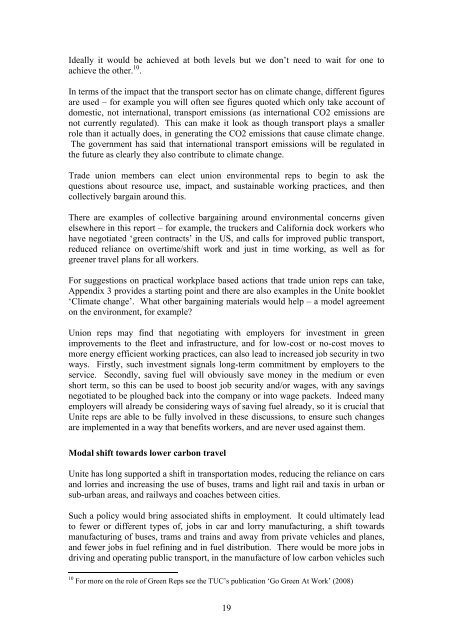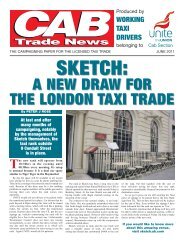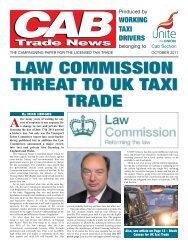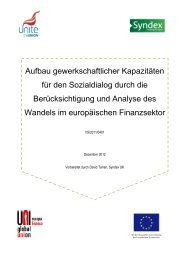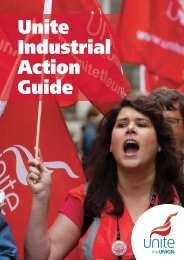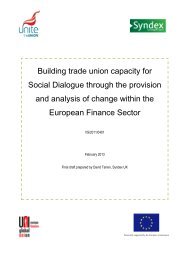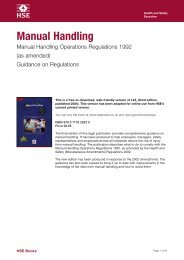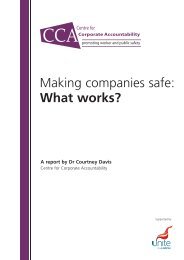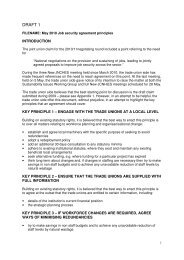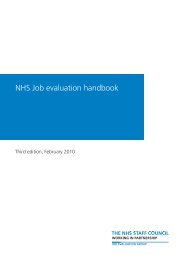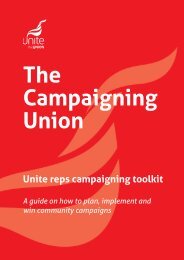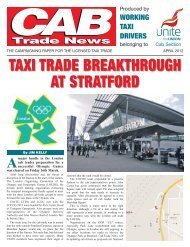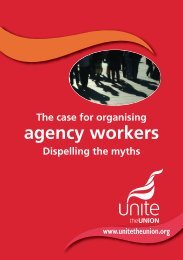Sustainable Transport and the Environment Guide - Unite the Union
Sustainable Transport and the Environment Guide - Unite the Union
Sustainable Transport and the Environment Guide - Unite the Union
You also want an ePaper? Increase the reach of your titles
YUMPU automatically turns print PDFs into web optimized ePapers that Google loves.
Ideally it would be achieved at both levels but we don’t need to wait for one to<br />
achieve <strong>the</strong> o<strong>the</strong>r. 10 .<br />
In terms of <strong>the</strong> impact that <strong>the</strong> transport sector has on climate change, different figures<br />
are used – for example you will often see figures quoted which only take account of<br />
domestic, not international, transport emissions (as international CO2 emissions are<br />
not currently regulated). This can make it look as though transport plays a smaller<br />
role than it actually does, in generating <strong>the</strong> CO2 emissions that cause climate change.<br />
The government has said that international transport emissions will be regulated in<br />
<strong>the</strong> future as clearly <strong>the</strong>y also contribute to climate change.<br />
Trade union members can elect union environmental reps to begin to ask <strong>the</strong><br />
questions about resource use, impact, <strong>and</strong> sustainable working practices, <strong>and</strong> <strong>the</strong>n<br />
collectively bargain around this.<br />
There are examples of collective bargaining around environmental concerns given<br />
elsewhere in this report – for example, <strong>the</strong> truckers <strong>and</strong> California dock workers who<br />
have negotiated ‘green contracts’ in <strong>the</strong> US, <strong>and</strong> calls for improved public transport,<br />
reduced reliance on overtime/shift work <strong>and</strong> just in time working, as well as for<br />
greener travel plans for all workers.<br />
For suggestions on practical workplace based actions that trade union reps can take,<br />
Appendix 3 provides a starting point <strong>and</strong> <strong>the</strong>re are also examples in <strong>the</strong> <strong>Unite</strong> booklet<br />
‘Climate change’. What o<strong>the</strong>r bargaining materials would help – a model agreement<br />
on <strong>the</strong> environment, for example?<br />
<strong>Union</strong> reps may find that negotiating with employers for investment in green<br />
improvements to <strong>the</strong> fleet <strong>and</strong> infrastructure, <strong>and</strong> for low-cost or no-cost moves to<br />
more energy efficient working practices, can also lead to increased job security in two<br />
ways. Firstly, such investment signals long-term commitment by employers to <strong>the</strong><br />
service. Secondly, saving fuel will obviously save money in <strong>the</strong> medium or even<br />
short term, so this can be used to boost job security <strong>and</strong>/or wages, with any savings<br />
negotiated to be ploughed back into <strong>the</strong> company or into wage packets. Indeed many<br />
employers will already be considering ways of saving fuel already, so it is crucial that<br />
<strong>Unite</strong> reps are able to be fully involved in <strong>the</strong>se discussions, to ensure such changes<br />
are implemented in a way that benefits workers, <strong>and</strong> are never used against <strong>the</strong>m.<br />
Modal shift towards lower carbon travel<br />
<strong>Unite</strong> has long supported a shift in transportation modes, reducing <strong>the</strong> reliance on cars<br />
<strong>and</strong> lorries <strong>and</strong> increasing <strong>the</strong> use of buses, trams <strong>and</strong> light rail <strong>and</strong> taxis in urban or<br />
sub-urban areas, <strong>and</strong> railways <strong>and</strong> coaches between cities.<br />
Such a policy would bring associated shifts in employment. It could ultimately lead<br />
to fewer or different types of, jobs in car <strong>and</strong> lorry manufacturing, a shift towards<br />
manufacturing of buses, trams <strong>and</strong> trains <strong>and</strong> away from private vehicles <strong>and</strong> planes,<br />
<strong>and</strong> fewer jobs in fuel refining <strong>and</strong> in fuel distribution. There would be more jobs in<br />
driving <strong>and</strong> operating public transport, in <strong>the</strong> manufacture of low carbon vehicles such<br />
10 For more on <strong>the</strong> role of Green Reps see <strong>the</strong> TUC’s publication ‘Go Green At Work’ (2008)<br />
19


